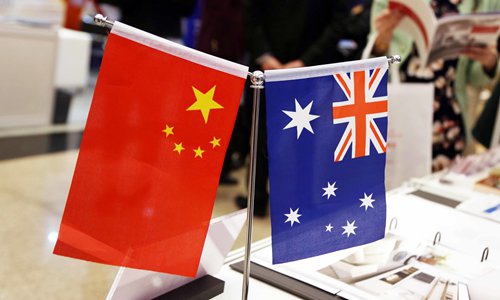Trade diversification in doubt as Canberra obsesses over politics
Source:Global Times Published: 2020/5/17 20:33:08

File photo
Politicians from the Morrison government appear more willing to encourage Australian companies to explore new markets rather than make any effort to ease the simmering tensions with China, disregarding the fact that global demand is shrinking rapidly amid the COVID-19 pandemic.
Australia's trade minister Simon Birmingham warned on Sunday that Australian businesses could be encouraged to pursue a diversification strategy as China's "unpredictable regulatory interventions" have created additional risks for trade.
"I would, of course, encourage business, where they can see equal reward or similar reward, by spreading their risk across numerous markets, to do so. And that would be wise business practice," Birmingham said.
The trade minister may be suggesting that Australia could be independent of the Chinese market, but it is highly dubious whether their businesses will buy his view. While a diversification push may be always justified in the business world, it doesn't necessarily mean there are other markets that can serve as a lifeline for Australian companies in case of a trade conflict with China.
As the coronavirus pandemic still rattles the world economy, it is widely anticipated that a global recession is underway to weigh down market demand. Against such a backdrop, it is basically unrealistic to pursue so-called diversifying export markets. And if there were other markets Australian companies can sell to, how could they wait for the government to remind them?
To be clear, whether Australia considers new markets won't cause much trouble to China. It won't be a problem for Chinese consumers to buy beef and wine, among others from other alternative suppliers.
Moreover, the Australian government seems more interested in exploiting China's suspension of some beef imports and its potential imposition of tariffs on Australian barley to describe itself as a victim of trade sanctions. Australian Prime Minister Scott Morrison said on Friday during a press conference that there are lines about "important things", and "those things are not to be traded, ever." And Birmingham complained that his request for a call with his counterpart remains unanswered.
But don't forget that it is the Morrison government that has been unfriendly to China all the time, destroying the foundation of normal trade. One reason we can think of why the Chinese side hasn't arranged the call is that their trade disputes cannot be simply solved through a phone call, as it requires rebuilding trust between the two sides.
With bilateral relations hitting a bottom point, any move taken by China that may impact the interests of Australian business could be interpreted by observers as retaliation or a threat to force Canberra to change tones or make "ideological compromise," even though Australian officials admitted that the barley issue has been underway for some time and the beef import suspension also has good reasons.
From China's perspective, Australia has never been a friendly trading partner, and consultations with the country on trade issues have always been frustrating, which has apparently weakened its motivation to promote bilateral trade.
Posted in: GT VOICE